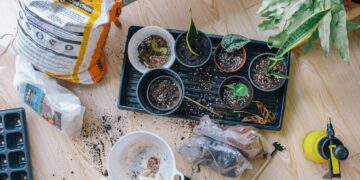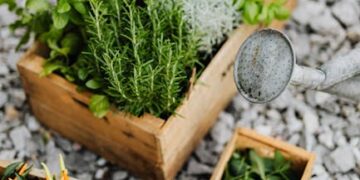Unlocking Secrets to Enhancing Your Garden Plant Health: A Comprehensive Guide
Welcome to our comprehensive guide on boosting the health of your garden plants! Whether you’re a budding gardener or have years of experience, you’ll find practical tips and tricks here to help your garden flourish like never before. Let’s delve into the secrets that can make your green space not just survive, but thrive!
Understanding the Basics of Plant Health
Before diving into advanced techniques, it’s important to cover the foundation of plant health. Plants, much like humans, need proper nutrition, a good environment, and care to thrive.
The Role of Sunlight
All plants require sunlight to perform photosynthesis, but the amount needed can vary widely. While some plants thrive in full sun, others prefer partial shade. It’s crucial to know the sunlight requirements for each plant in your garden to place them strategically for optimal growth.
Watering Wisdom
Water is another fundamental need for plants, but overwatering is a common mistake. The key is to water deeply but infrequently, which encourages roots to grow deeper into the soil, making plants more resilient and less needy.
Soil Secrets
Healthy soil equals healthy plants. Soil should be loose, rich in nutrients, and have good drainage. Regularly adding organic matter like compost can dramatically improve soil quality and thus plant health.
Advanced Techniques to Boost Garden Health
With the basics in place, you can now explore more advanced strategies to take your gardening to the next level.
Companion Planting
Companion planting involves strategically positioning plants that can help each other grow. For example, marigolds emit a natural toxin to many soil-borne pests and can help protect tomatoes. Similarly, planting basil near tomatoes not only improves flavor but also repels pests.
Mulching Magic
Mulch helps retain soil moisture, suppress weeds, and improve soil quality. Organic mulches like bark decompose over time, adding nutrients back into the soil. Remember to keep the mulch a few inches away from plant stems to prevent rot.
Pest Management
Natural pest control is preferable to chemical options, especially for home gardens. Introducing beneficial insects like ladybugs, using neem oil, or planting pest-deterring plants are effective ways of keeping pests at bay without damaging the ecosystem of your garden.
Nurturing Your Garden Plants
Long-term plant health is about regular maintenance and acute problem-solving when necessary.
Pruning Practices
Proper pruning not only keeps plants looking their best but also improves their health. Removing dead or diseased wood and thinning out crowded areas increases air circulation, which reduces the risk of diseases.
Fertilizing Fundamentals
Fertilizers can be critical, especially for nutrient-hungry plants. However, it’s important to use the right type and amount. Over-fertilizing can harm plants. Organic fertilizers release nutrients more slowly and are often more forgiving than synthetic varieties.
Regular Health Checks
Regularly inspecting your plants can help catch issues like diseases or insect infestation early, which is crucial for effective treatment. Yellow leaves, stunted growth, or spotty blooms can all indicate health problems.
Seasonal Care for Year-Round Success
Each season brings different care requirements and opportunities for enhancing plant health.
Spring Into Action
Spring is a great time for planting new additions, fertilizing, and mulching. It’s also a good moment to prune winter damage once plants start showing new growth.
Summer Strategies
Summer demands more frequent watering and pest management. It’s also prime time to enjoy the blooms and harvest any vegetables or fruits.
Autumn Adjustments
In autumn, prepare your garden for winter by removing spent annuals, adding mulch, and planting spring-blooming bulbs. This is also a perfect time for dividing perennials.
Winter Watchfulness
Winter is less about active gardening and more about planning. Protect sensitive plants from frost and plan next year’s garden to keep your spirits up until spring!
Conclusion
Enhancing the health of your garden plants doesn’t require a green thumb, simply a willingness to learn and experiment. By understanding the basic needs of plants and employing a few advanced techniques, anyone can transform their garden into a lush, vibrant landscape. Remember, every plant has its unique requirements and with patience and practice, your gardening skills will naturally grow.
So go ahead, use these tips to nurture your garden, and enjoy the flourishing results of your dedicated care!




















































